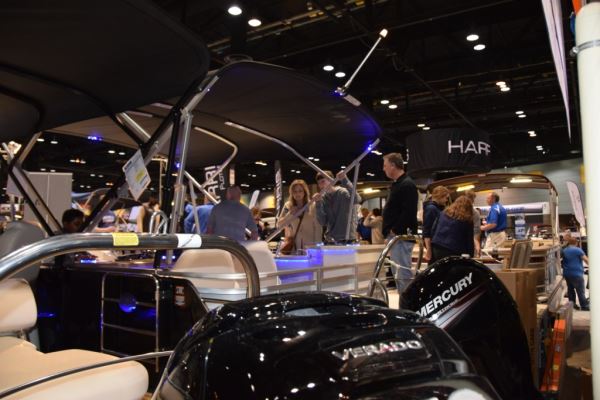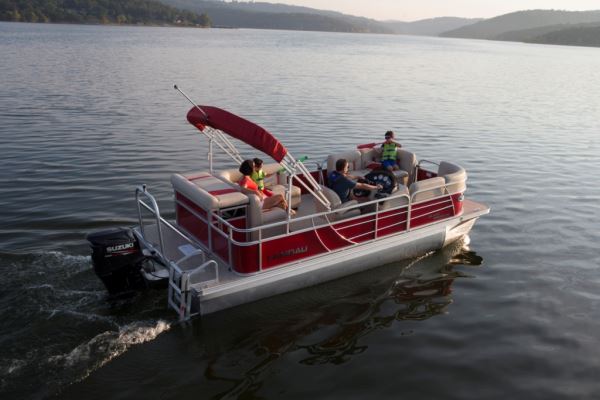
Thinking of buying a pontoon? Overwhelmed by the choices and the different manufacturers and dealers? Let me share a few of the things I have learned through the years.
Apologies if you have heard this before, but I believe that buying a “practical” boat for an individual situation is a boat buyer’s best option. But you need to know what practical means. My favorite definition is “appropriate or suited for actual use.” For years I have given seminars around the country on the practical aspect of buying and owning boats. My seminars are based around this definition of practical.
When the boat buying process starts it’s usually influenced by advertisements, videos, boat shows, dealers and the local lake. It’s a very emotional purchase. The buyer’s imagination runs wild with all the potential uses and emotions. Often what we see and think we want might not be the best for us personally. That’s why I recommend people step back and take a practical approach to buying a boat. Is the boat appropriate and suited for me and my use?
To make this practical process easier, I usually recommend boat buyers start with “CPLUS.” CPLUS is a handy acronym for Cost, Preferences, Location, Use and Skill. Once you know what you can spend, what you want, where you will keep the boat, how you will use the boat and what type of boating skills you have, you can start looking at what and where to buy the boat.
Looking at CPLUS from more of an objective position doesn’t mean I can’t buy what I want and spend whatever it takes to get what I like; it just helps put the decision in a more practical perspective.
I try hard to live by my own recommendations. I have a bit of an ego and almost always my first choice for anything is the newest, fastest, highest horsepower and equipped with the most advanced gadgets possible. But the reality of being married to a recovering accountant for 30 plus years slowly creeps in and practicality becomes more important.
This brings me back to the C in CPLUS. Cost is probably the biggest issue for most people. How much does it cost to buy, own and maintain a boat? It’s more than just the purchase price. If you buy a cheap boat or an expensive boat, it’s kind of a fixed cost. Once you buy the boat you still need storage, fuel, maintenance and insurance. If the boat owner can’t afford to use the boat because it burns too much fuel or it is too hard to store or whatever, the owner loses interest and the boat deteriorates.
It’s important to know where the costs are. Look at the basic cost of a two-tube ‘toon compared to a three-tube ‘toon. Not only does the third ‘toon get you more buoyancy and performance, but it usually requires more horsepower to achieve those benefits. So besides the increase in performance the initial purchase price increases $7,500 or more, and so does the fuel burn. My simple rule of thumb for fuel burn calculation is “ten percent of horsepower per gallon per hour.” So a 60 horsepower engine burns about six gallons an hour at full throttle. A 90 horsepower engine burns about nine gallons per hour and so on. More horsepower is great, but it costs more in weight and fuel burn and purchase price. I’m not saying to buy a small engine or a two-toon boat (that’s another column). I’m just saying you need to be cognizant of the effect of your purchase decisions.
This is where you get that old line of “the two best days in boat ownership are when you buy the boat and when you sell the boat.” This is usually repeated by people who bought or kept something that was impractical for their situation. Situations change. Buying a big boat with a big family doesn’t mean we need to keep that same big boat if your economic or family situations change. Change is constant; kids go to college and people retire or get divorced. That’s not the boating industry’s fault; it’s just the way things happened. But instead of taking it out on the boating community by complaining about your boat and how expensive boating is, change your situation and accept it.
Okay, as you can tell, I don’t believe it has to be that way. This needs to be a guilt-free activity. Boating is fun and can be an economical adventure, if you use a practical approach.
CPLUS is personal and subjective. You can have whatever you want if you are willing to pay for it. All I am saying is to revisit what your practical preferences are.
From a practical standpoint I base my boat on a fairly small lake; I have a slip reserved every year that is 28 feet by 12 feet. I have a Jeep that pulls 6,000 pounds and my wife, Jeanne, myself and an 80-pound standard poodle are the usual crew. I don’t really take part in water sports anymore. My kids are grown up, I have no grand kids, I don’t need to go super-fast and I like hanging out on the lake and enjoying sunsets (which is pretty evident from all the sunset Twitter pictures I post). I can always take a few more people out, but it’s not a regular thing. What I do with the boat most of the time is the key. “Buy and use” is my motto. If I’m not using it, why buy it?
That said, what I wanted was a 30-foot triple pontoon with three 300 horsepower engines.
But once I thought about it seriously, I started shopping a number of different brands and I bought a new 20-footer with a 60 horsepower outboard.
In our comparisons we were pretty impressed with what we have for the money. Good quality, lots of features and reasonably priced. The boat is perfect for the way we use it. Small enough to handle on and off the trailer, fast enough to get me back to shore when needed, roomy enough to entertain and big enough for our lake. And we have pulled a friend on her wakeboard with no problems. It’s not a wakeboard boat, but it works. Just a reminder that you don’t always need a “big” pontoon; it all depends on your personal situation. As I like to say (and I’ve owned both), “You can buy a Corvette or a Miata…both are fun, just different.
Publications like Pontoon and Deck Boat magazine and their online forums can help narrow the search. Be careful with the Internet, though. The Internet is full of “advice.” Just because you read it online doesn’t mean it’s the right or the best advice for you or even factual. A favorite quote of mine from Don Miguel Ruiz is, “Be skeptical, but learn to listen.” Reading and listening to others’ opinions provides valuable information. Using all of that information can help an “educated” boat buyer find a boat that will provide years of fun at a price within their budget.
You can always shop Craigslist (or any other boat selling websites) for used boats but buying new generally means buying through a dealer. Finding a good dealer is as important as finding the right boat.

Check out boat dealers in your area first and expand the radius. Start by asking a lot of questions. You don’t have to be at the dealership to ask a few basic questions. You can do this via e-mail, through the internet, with a telephone call or in person. In the beginning you want to find out if the dealer even offers what you want. Why drive all over the area if the dealer is a wakeboard specialist and you want a pontoon? Do the preliminary research without wasting the time and gasoline. If you are in a location that has very few dealers, your choices may be limited, but don’t let that stop you from getting a good dealer. A good boat dealer may only be a few hours away. But remember, distance will affect serviceability.
A few basic questions to ask the dealer could be:
1. How long have you been carrying brand “x” boats?
2. What’s the horsepower range on this boat?
3. What range will this boat have if I have six people in it and a full tank of fuel?
4. What kind of wake does it throw out for water sports?
5. Is my vehicle powerful enough to pull the boat?
6. What service do you offer and what kind of parts do you stock?
7. Is your shop open on the weekends?
8. Do you offer pickup, delivery or in-slip service work?
9. What type of guarantee or warranty does your service center offer?
10. Do you offer “sea” trials?
While this is only ten questions (many more are possible) it will give you an idea of where to start. I personally change my list depending on the type of boat I am trying to buy. You can change the list of questions if you are buying a used boat from a private seller. But if you are looking for support, service or a warranty, a new or used boat from a dealer is the only way to go.
One more thing: head out to the local lake where you are going to be using the boat and check out what the local boaters own and ask if they bought from a dealer. Reputation is a big issue in boating, just like any other business. The only way to check someone’s reputation is to ask boaters. You are trying to find a dealer that is well known for the right reasons. Just because they have the reputation of being the biggest or the cheapest doesn’t mean they will be the best.
If it came down to one sentence, look for a dealer that pays attention to you and what you need and want. Oh, and make sure the boat feels right. When it is all over, if you don’t like the color, the style, the sound or the way the boat rides, it is not the right boat. That means you need a sea trial. You are the only person that can make that decision. But when you find a good dealer, they can put you in the right boat and keep your family on the water.

